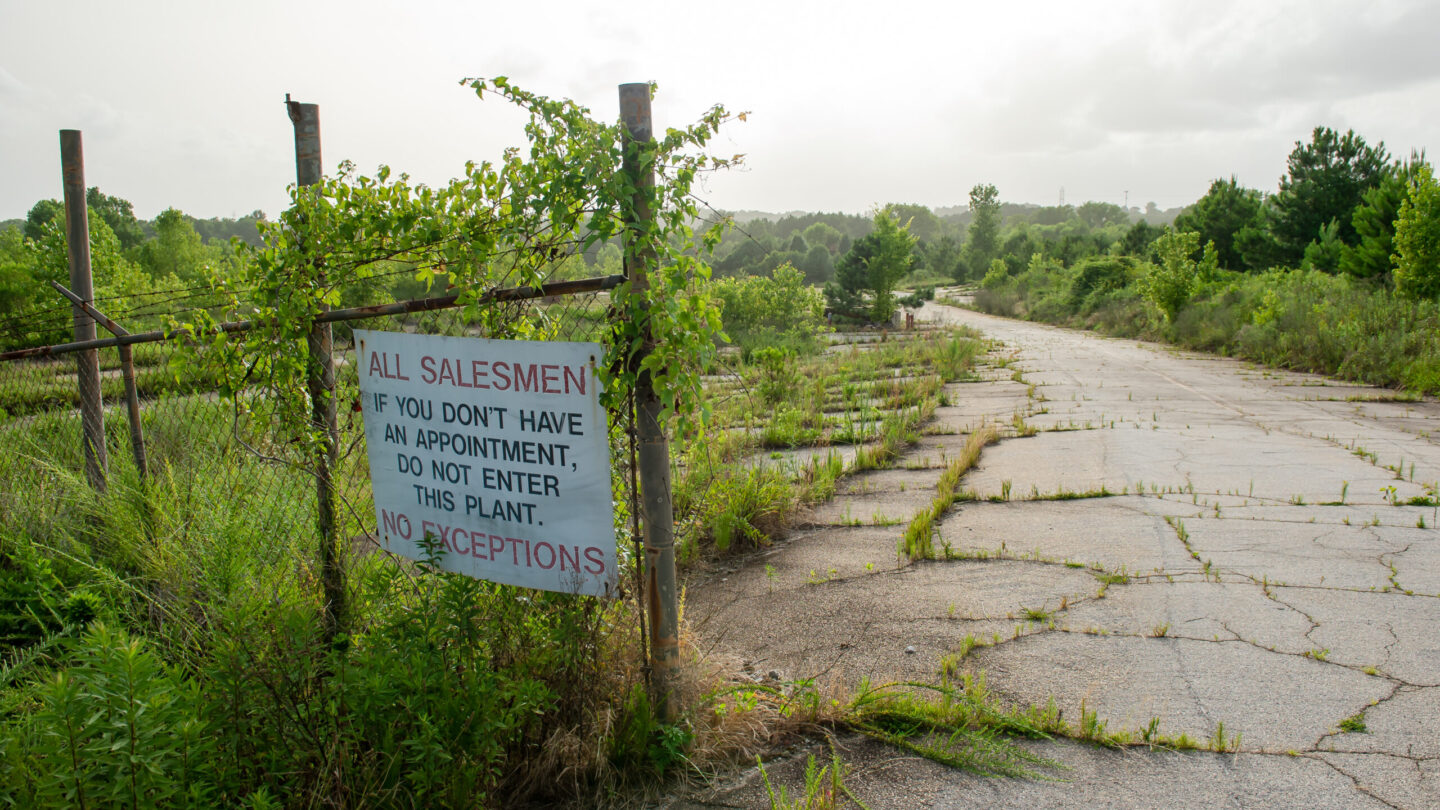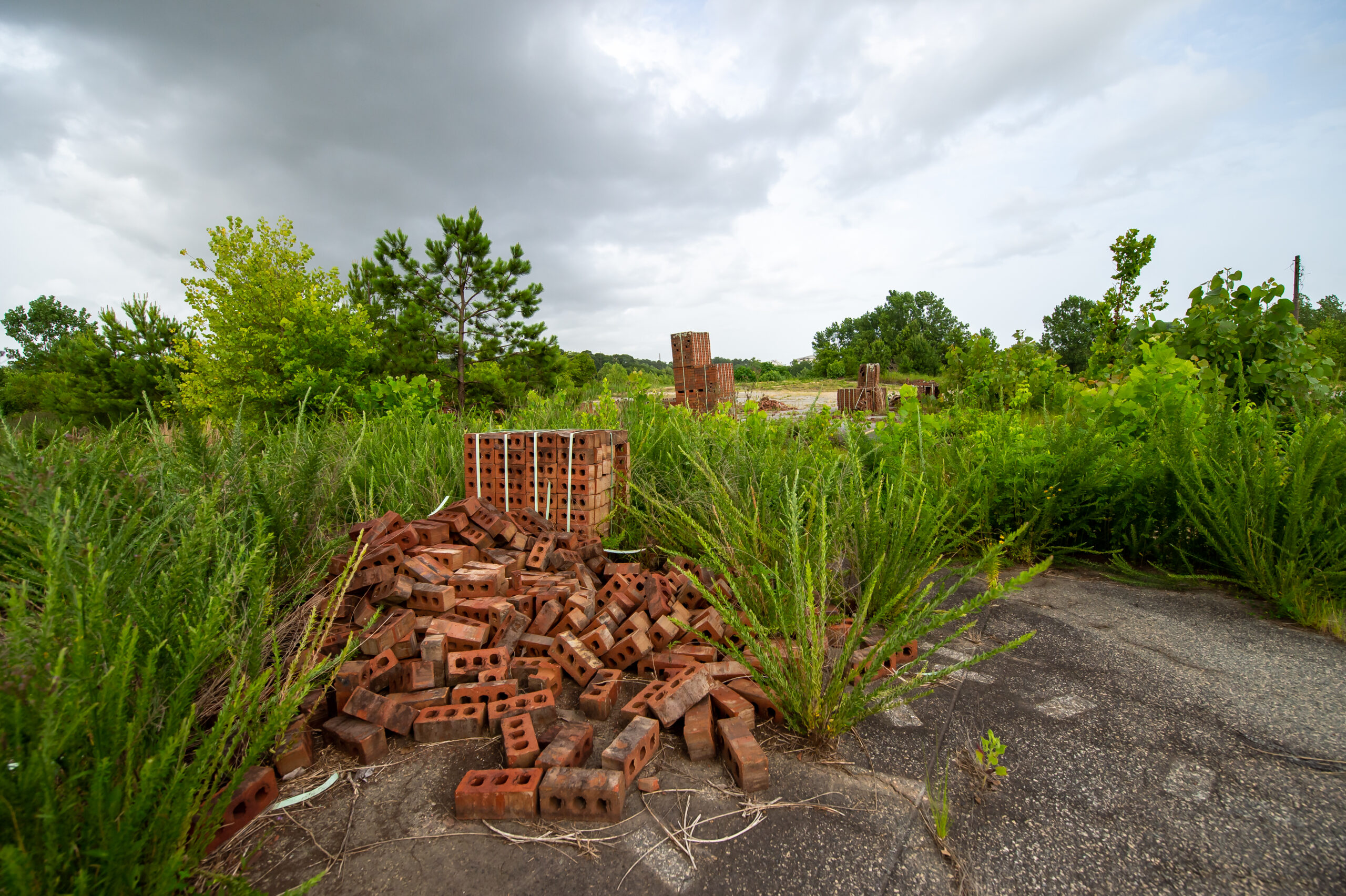After years of community advocacy, Chattahoochee Brick site belongs to Atlanta

The entrance to the former site of the Chattahoochee Brick Company, located on the western edge of Atlanta at the confluence of Proctor Creek and the Chattahoochee River, is shown.
BITA HONARVAR / Special to wabe
Following years of grassroots advocacy, the City of Atlanta now owns the former site of the Chattahoochee Brick Company.
The factory made bricks that helped build Atlanta, using forced convict labor. Community activists successfully fought plans to build an industrial facility at the site, and now the city plans to build a park and a memorial there instead.
The city held an event at the site on Saturday to celebrate acquiring the property, and to talk about what comes next for it.
“It has taken us some twists and turns to get to this point. But finally, this day has arrived,” Mayor Andre Dickens said to the crowd gathered at the site.
Dickens, who’s previously said he thinks his own house might be built from bricks from the factory, said he’s proud to be from a city that can acknowledge an ugly and painful history and keep moving forward.
“When we talk about one city with one bright future, that means overcoming the dark spaces, the dark past, the places that don’t reflect the future we want to have,” he said.
The brick factory
The Chattahoochee Brick Company operated around the turn of the 20th Century. It supplied the bricks that built Atlanta roads and homes from its location on the Chattahoochee River, in Northwest Atlanta.
The brick factory was owned by former Atlanta mayor and Confederate captain, James English.
And it used convict labor, in a post-Civil War system where people – mostly Black men, were arrested for crimes – often minor crimes – then forced to work.
They could be bought and sold. They were treated brutally. People were beaten and died there.
The factory is gone now; the site is mostly cracked concrete, piles of bricks left by a more recent factory and weeds, but Donna Stephens said she gets emotional when she visits the area.
“I still feel a certain type of way when I’m on the property,” she said.
Stephens, the founder of a group called the Chattahoochee Brick Company Descendants Coalition, was visiting the site with Stacy Funderburke, who works in the Atlanta office of The Conservation Fund, a couple of weeks before the city’s celebration there.
The two of them played roles in the years-long fight to protect this property.
Pieces of a puzzle
Stephens grew up in the area, in a neighborhood named after English, but she didn’t know the story of the brick company until she was an adult and she saw the documentary, “Slavery by Another Name,” based on the Pulitzer Prize-winning book by the Atlanta journalist Douglas Blackman.
She said when she first learned the history, she was stunned.
When she found out, several years ago, that there were plans to build a fuel shipping terminal on the site, she was shocked again.
“My knees kind of buckled under me,” she said.
Then, she started working to stop it.
“It all came to me in bits and pieces. It was like a 1000 piece puzzle,” she said.
It wasn’t just the history that mattered to her. It was also the environment, along the Chattahoochee River and Proctor Creek, a polluted waterway she’s worked to get cleaned up.
And she saw it was also about the health of nearby residents, in a part of the city with a lot of industrial development, and little access to food and healthcare.
“We already have high rates of cancer, diabetes, heart disease. The walkability score’s in the toilet,” she said. “It’s all interrelated.”
Funderburke credits Stephens for putting all those pieces together.
He said it made a difference. Since the property is along the Chattahoochee River, people had long eyed it for a potential trail, but because the land is polluted, and the area is heavily industrial, the idea was always narrower, he said, a hope for a little strip of land just along the river.
But with Stephens and other community members bringing the history here to light, Funderburke said that changed what was possible.
“Without Donna’s work, and the community’s work bringing out the history of the site, and the significance of the site, there never would have been an opportunity for the Conservation Fund to come in, or the city to step in,” he said.
Stephens spent years making phone calls and going to meetings, getting community buy-in, and then political buy-in.
The plan for a fuel shipping terminal was blocked in 2017 after Atlanta denied the property owner, Lincoln Terminal, a necessary permit.
In 2020, a similar plan came up again. This time, Atlanta-based railroad Norfolk Southern planned to lease the property from Lincoln and build the terminal itself.
Early last year, then-mayor Keisha Lance Bottoms’s Administration began pushing back against that project, and Norfolk Southern then canceled it.
“I realized this was the window,” Funderburke said.
The non-profit Conservation Fund helps governments buy land, and it’s worked a lot with Atlanta. But even then, the deal for this land almost fell through when another offer came in for it. They had to find more funding. The local Kendeda Fund donated $4 million to help.
The total cost for the 77-acre property ended up being $26 million.
Funderburke said it’s worth it.
“To educate people and have a memorial to the people who suffered here, that is a game changer,” he said. “To me that is nationally significant for the history of the U.S., and of course really important for the city of Atlanta going forward.”
Funderburke said city employees from all different departments – planning, legal, parks and watershed – have worked hard to acquire the land. And he said he appreciated Lincoln Terminal’s patience through the negotiations.
In an email, Lincoln Terminal president Larry Burgamy said the deal couldn’t have happened without Funderburke’s work.
“I am pleased the transaction reached a favorable outcome for the City,” he said. “We are all very happy for the City.”
The National Center for Civil and Human Rights is organizing meetings now, and will eventually hold community sessions to ask people what kind of memorial they’d like to see here.
Stephens is involved in that work, too.
“You know, there’s that saying, ‘I am my ancestors’ wildest dream.’ I know that I recognize that,” she said. “The fact that the three of us can stand here and have a conversation about this. It’s freedom in and of itself.”
Back to work
There’s still a lot of work to do on the property, which has had some remediation work done, but is not totally cleaned up.
At the event on Saturday, Atlanta City Councilman Dustin Hillis, who represents the area and has backed the years-long effort to protect the land, said the work is just beginning on this land, which will eventually be one of Atlanta’s first parks with direct access to the Chattahoochee River, in addition to being a memorial.
“There’s a saying, ‘You can’t find the railroad.’ But we fought the railroad,” he said. “So wipe your brows and breathe that sigh of relief. But now, we must get back to working together, planning for our future.”
Stpehens, who also spoke, said she was full of joy, as she welcomed everyone under the tent.
“I didn’t know this would ever occur,” she said. Next month, the city is holding a community meeting about work to clean up the property.







